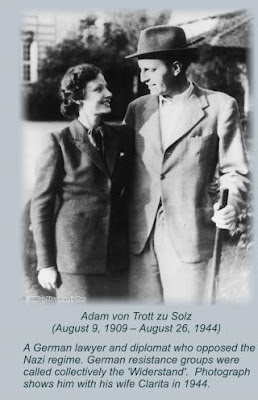The opposition to fascism has many faces.
A totalitarian state that suppresses freedom of opinion and systematically humiliates, oppresses and slaughters their victims, intimidates the majority into complicity and passivity. Even those few with the moral fortitude to resist are largely isolated in a brutally conformist society with almost no means to express opposition. In such a situation, sharing facts becomes an act of "rebellion," while even the smallest acts of kindness towards the victims of the state become a form of "opposition."
The German Resistance was qualitatively different from the other
anti-Nazi resistance movements in Europe. The anti-Nazi resistance movements in
France, Denmark or Poland, for example, were about freeing their countries from
a foreign invader. The German resistance—which, incidentally, started
long before the War began much less was lost—in contrast, was based on moral
outrage rather than with conventional patriotism.
However, before anyone gets the wrong impression, there was not one "German Resistance Movement." There were many Germans—from a whole range of different personal, ideological and political backgrounds, who were outraged by Hitler and his policies. Some of these people opposed Hitler long before he came to power — most obviously the Socialists and Communists. Others, initially supported Hitler but more or less rapidly came to recognize the moral depravity of his regime.
Many opponents of the regime formed small cells of resistance based on common roots in the banned political parties, the trade union movement or the like. Others came together over time as loose coalitions of like-minded people living in a sea of fanatical supporters, opportunistic hangers-on and informers. The goals of the various resistance groups varied from the Communist cells that actively attempted to assist the Soviet Union establish a Communist regime in Germany to the unorganized individuals, who —at the risk of their own lives— tried to help the victims of the regime by providing false documents, safe-houses, food and other aid.
The most important resistance organization, however, was a
coalition of active and retired military officers and civilians who worked to
over-throw the Nazi regime and replace it with a government dedicated to
restoring the Rule of Law. This conspiracy initially hoped to put Hitler
on trial for his crimes, but gradually recognized that only Hitler's
elimination would reduce the risk of civil war. They made a number of
assassination attempts between 1942 and 1944, the last of which nearly
succeeded.
My novel, "Traitors for the Sake of Humanity," focuses on two strands of the resistance: first, the primarily military conspiracy that culminated in the only coup attempt against Hitler, that on July 20, 1944, and second, the humanitarian resistance that was loosely organized, non-ideological and essentially a personal commitment to decency — at the risk of one’s life on the part of each participant. Find out more and read reviews of "Traitors" at the publisher's website: Cross Seas Press.



No comments:
Post a Comment